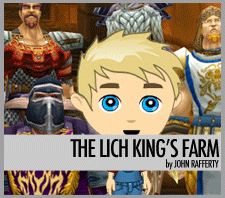The Wrath of the Lich King’s Farm
Posted by John Rafferty | May 7, 2010
There’s been a lot of talk over the past few years about approachable gaming mechanics infiltrating the hardcore space. When Madden 2011 releases this August, it will include a new gameplay feature meant to acclimate the gamer to an overwhelming virtual playing field of multi-button juke moves, coverage audibles, and receiver hot routes by speaking directly in the player’s ear. Sam Fisher’s latest adventure scrapped the classic Splinter Cell pure stealth, trial and error gameplay in favor of a more accessible choose-your-own-style-of-killing-bad-guys approach, to the chagrin of some of the series’ more rabid fans. Even Bioware toned down many of the traditional RPG elements in Mass Effect’s sequel in an effort to reach a wider market of shooter fans. Developers and publishers have an obvious interest in growing their audiences, especially considering the multi-million dollar price tags associated with AAA titles. Amongst all that approachable talk, however, there’s been little mention of the other side of that coin, that is, the hardcore mechanics of approachable, and social, gaming.
At this week’s Social Gaming Summit 2010, Ohai’s Susan Wu mentioned, almost in passing, that “Farmville is teaching non-hardcore gamers very hardcore tendencies, like click farming over and over and over.” When you think about Farmville, or most social game experiences in that sense, their similarities to classic “hardcore” titles are readily apparent. Any World of Warcraft player can tell you that most early quests are little more than a study in patience as they “grind” away at leveling up their character. Unsurprisingly, Blizzard’s other giant, Diablo, perfected the art of point and click (and click and click) adventuring, driving players to addictive lengths for more virtual loot. Yet whereas these hardcore adventures had something of a narrative to drive, or at least condone, the relentless behavior, social titles have taken hardcore mechanics a step further in stripping out the story aspect in favor of pure digital goodie greed. You’re not saving a princess, after all, but merely building a bigger farm or hotel than your facebook friend, in an overwhelming display of pure competition – another traditional hardcore tenant. And if you don’t have the time to “grind” away building your restaurant, or hotel, or nautical wonderland, you can buy your way to the next level with virtual currency, similar to MMORPG’s gold farming shops – a practice even the hardcore community condemns.
These similarities, in conjunction with game mechanics’ growing presence in the social psyche (e.g. FourSquare, MyTown, Jesse Schell’s DICE talk), may mean that the differences between hardcore and approachable gaming experiences are becoming less and less about those actual mechanics, and more so about the game’s content. It’s this consideration that could impact gamers’ choices going forward, so long as game makers capitalize on the cross-over mechanics, and evangelize those options to a growing market. Gamers of all types can focus less on limiting their experiences based on those traditional classifications, opening the doors to an expanded gaming library they may have never even considered. That’s not to say that women 35-54 will soon be joining guilds as they raid the dungeons of Azeroth, but if they did, the Lich King might be surprised by their grinding skills.
On the other hand, this could all just mean that Watercooler’s Andrew Sheppard was right in that “more social games are being built as lead-gen applications [instead of actual game experiences]” and we’re doomed to addictive click harvesting till the cows come home.
Leave a Comment
RSS feed for comments on this post · TrackBack URI


